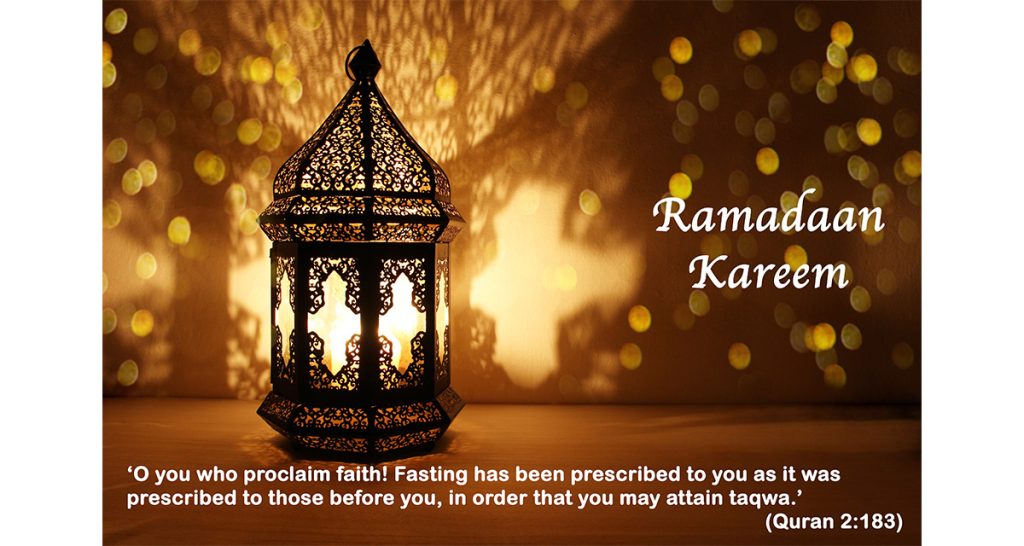Ramadan and Taqwa (piety) share an intrinsic bond, as the holy month is a pathway to nurturing and deepening one’s sense of Taqwa. Through fasting, Muslims exercise self-discipline, self-restraint, and mindfulness, aligning their actions and intentions with the teachings of Islam. Ramadan’s emphasis on spiritual reflection, increased acts of worship, and heightened awareness of Allah’s presence fosters a profound sense of Taqwa. As individuals strive to fulfill their religious duties and seek forgiveness, they cultivate a deeper reverence for Allah and a commitment to righteous conduct, thereby embodying the essence of Taqwa and drawing closer to spiritual fulfillment.

Ramadan: The Road to Piety (Taqwa) and its Impact on Community Bonds”
Fasting during Ramadan significantly strengthens social ties within the Muslim community through various practices and teachings emphasized by Prophet Muhammad (PBUH). One prominent aspect is the communal practice of Iftar, the meal for breaking the fast at sunset. The Prophet Muhammad (PBUH) emphasized the virtue of providing Iftar to fasting individuals, stating that whoever does so will receive a reward equal to the fasting person’s without diminishing the reward of the fasting person. This encourages Muslims to share meals and extend hospitality to one another, fostering a sense of unity and solidarity.
Moreover, Ramadan serves as a time for increased empathy and compassion towards the less fortunate. Through experiencing hunger and thirst during the fast, Muslims gain a deeper understanding of the struggles faced by those who are less privileged. This heightened awareness inspires acts of charity and support for those in need, further strengthening the bonds of brotherhood and sisterhood within the community.
Additionally, the concept of solidarity is emphasized during Ramadan, as Muslims are encouraged to support and assist one another in various ways. The fasting month is viewed as a time of heightened spiritual significance, during which the reward for good deeds is multiplied. As a result, there is a collective effort among Muslims to engage in acts of kindness, charity, and service to others. This shared commitment to serving the community fosters a sense of solidarity and mutual support, reinforcing the social fabric of the Muslim community.
Overall, fasting during Ramadan serves as a powerful catalyst for strengthening social ties within the Muslim community by promoting practices such as communal meals, empathy for the less fortunate, and solidarity in serving others. These teachings and practices, rooted in the example of Prophet Muhammad (PBUH), emphasize the importance of compassion, generosity, and unity, which are essential for building strong and cohesive communities.

Ramadan and Taqwa and Cultivating Moral Virtues Through Islamic Teachings
Fasting during Ramadan cultivates moral virtues in accordance with Islamic teachings by instilling empathy, compassion, and integrity. The Hadith narrated by Prophet Muhammad (PBUH) emphasizes relieving hardships, forgiving debts, and concealing faults, which are all acts of kindness and mercy. By observing fasting, Muslims experience hunger and thirst, fostering empathy for those in need and encouraging acts of charity and support. Additionally, the emphasis on concealing faults promotes humility and integrity, encouraging individuals to uphold honesty and refrain from gossip or slander. Through these teachings, fasting in Ramadan serves as a practical means to develop moral virtues and strengthen one’s character in alignment with Islamic principles.
Understanding the Three Degrees of Fasting: A Path to Deeper piety and taqwa During Ramadan
According to Al Ghazali, fasting is categorized into three degrees: the fast of the common folk, the fast of the elite, and the fast of the elite of the elite. The first level involves refraining from food, drink, and sexual desires, which is the basic requirement for fasting in Ramadan. The second level encompasses a deeper level of self-restraint, including abstaining from negative behavior such as lying, gossiping, or engaging in arguments. The third level represents the highest form of fasting, where individuals not only abstain from physical indulgences but also focus on purifying their hearts and intentions, seeking spiritual closeness to Allah.
Understanding these levels provides a framework for Muslims to aspire towards higher levels of piety and self-discipline during Ramadan. By recognizing that fasting involves more than mere abstinence from food and drink, individuals can strive to embody the deeper moral and spiritual aspects of fasting. This understanding encourages self-reflection, introspection, and a commitment to virtuous behavior, ultimately leading to a more profound connection with Allah and a transformative Ramadan experience.

Cultivating Empathy and Solidarity through Ramadan and Taqwa
Fasting during Ramadan strengthens social cohesion within the Muslim community by fostering empathy, solidarity, and communal bonds through various practices. One significant aspect is the communal practice of breaking the fast, known as Iftar, where Muslims gather to share meals. This tradition not only provides an opportunity for communal gatherings but also promotes generosity and hospitality as individuals invite others to their homes or participate in community Iftar events.
Moreover, fasting encourages empathy for the less fortunate, as Muslims experience hunger and thirst firsthand, leading to increased awareness of the struggles faced by others. This heightened empathy inspires acts of charity and support for those in need, further strengthening the bonds of brotherhood and sisterhood within the community.
read more: Wildlife of Iraq
Additionally, the shared commitment to fasting and spiritual reflection during Ramadan fosters a sense of unity and solidarity among Muslims. As individuals strive to fulfill their religious duties and seek forgiveness, they form a collective sense of purpose and belonging, reinforcing social cohesion and mutual support within the community. Overall, fasting during Ramadan serves as a powerful catalyst for enhancing social cohesion and promoting unity among individuals in the Muslim community.
Ramadan and Taqwa: Embracing Compassion, Integrity, and Humility
Fasting during Ramadan promotes moral virtues through the teachings of Prophet Muhammad (PBUH) by emphasizing compassion, integrity, and humility. The Hadith narrated by the Prophet underscores the importance of relieving hardships, forgiving debts, and concealing faults, all of which reflect acts of kindness, honesty, and empathy. These teachings influence individual behavior by encouraging Muslims to prioritize the well-being of others, exhibit honesty in their interactions, and demonstrate empathy towards those facing difficulties. By adhering to these moral principles, individuals cultivate a sense of integrity, compassion, and humility, which in turn fosters harmonious interactions and strengthens the fabric of the community.

Ramadan and Taqwa: Nurturing Connection, Growth, and Well-being
Fasting during Ramadan offers spiritual and psychological benefits that contribute to a profound sense of connection, personal growth, and overall well-being among Muslims. Spiritually, fasting fosters a deeper connection with Allah through increased acts of worship, such as prayers and recitation of the Quran. It provides an opportunity for introspection, repentance, and spiritual renewal, leading to a strengthened faith and sense of purpose. Psychologically, fasting promotes discipline, self-control, and mindfulness, which can enhance emotional resilience and mental clarity. By abstaining from physical indulgences, individuals may experience a heightened sense of gratitude, contentment, and inner peace. These spiritual and psychological aspects of fasting during Ramadan work synergistically to foster personal growth, deepen one’s spiritual journey, and cultivate a greater sense of well-being and fulfillment within the Muslim community.




